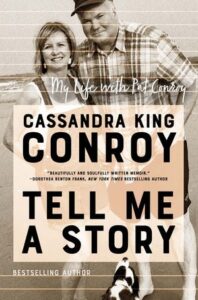
When I told my mom I was interviewing Cassandra King Conroy, wife of the late Pat Conroy, she was jealous, and a little starstruck.
“Oh, honey,” she said on the phone. “How cool!”
(This is how I knew she was starstruck. My mom is not normally so… succinct.)
I was a little dazzled myself, so much so that I called her Ms. King in my email to coordinate the interview. Cue instant mortification.
I apologized profusely when we talked and she laughed it off. Turns out she usually goes by Cassandra King, but her publisher wanted her to add Conroy to her byline for her recent memoir to appeal to her husband’s fans as well as her own.
But Cassandra King Conroy needs no force multiplier; her grace and charm are irresistible, and her talent for storytelling is natural. As a child, she wrote her own stories because she could make them turn out the way she wanted. Her writing career, however, was a little bit less direct.
“Being a writer was something I dreamed of as I was growing up, but I majored in English,” said King Conroy. “We didn’t feel like we had choices; it was not the time when we could be anything we wanted.”
She paused, and then chuckled.
“My mother said, ‘Oh no, young lady, you get a teaching certificate,’” she said. “She told me I needed something to fall back on in case something happened to my husband… I had no husband! But I got the certificate.”
King Conroy used that teaching certificate and raised a family, waiting until her children were older to seriously approach writing. The first piece she was ever paid to publish was a religious poem, although she said she’s a terrible poet. Six successful novels later, she embarked on a project far more personal — “Tell Me A Story,” a memoir of her life with her husband Pat.
The hardest part about writing “Tell Me A Story,” she said, was putting herself in it. Her editor sent the first draft back praising the writing but saying she didn’t feel like she knew King Conroy any better after reading it.
“I figured that was what she would say, and it’s a valid criticism of a memoir,” King Conroy said. “I’m a very private person, not normally the kind to tell my stories. But if you look at a memoir as a story about what you learned and how your memories affected you, it has to be a little more personal.”
Writing is King Conroy’s form of expression, her way of trying to understand herself and the world. It’s similar, she said, to the way musicians are compelled to make music.
“I can’t not write,” she said emphatically. “It’s so much a part of me, who I am.”
And if that’s your calling she said, you’ll find a way to do it. Even if it takes a little time or a more circuitous route.
This article was first published in the Tallahassee Democrat.
